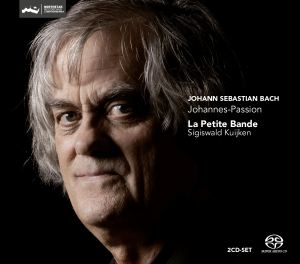 |
 |
|


alternatively
CD: MDT
AmazonUK
AmazonUS
|
Johann Sebastian BACH (1685-1750)
St. John Passion, BWV 245 (1725) [105:14]
 Gerlinda Sämann (soprano); Petra Noskalová (alto); Christoph
Genz (tenor - Evangelist); Jens Hamann (bass - Christus)
Gerlinda Sämann (soprano); Petra Noskalová (alto); Christoph
Genz (tenor - Evangelist); Jens Hamann (bass - Christus)
La Petite Bande/Sigiswald Kuijken
rec. 17-20 April 2011, Academiezaal, St. Truiden, Belgium. DSD
German text included. Notes in English, French, German
 CHALLENGE CLASSICS CC72545
CHALLENGE CLASSICS CC72545  [33:35 + 71:49]
[33:35 + 71:49]
|
|
|
Sigiswald Kuijken’s recording of the St. John Passion
isn’t quite one-to-a-part. As he explains in the booklet,
it’s not possible to sing the work with just four singers.
However, it’s as close as we’re likely to get. This
very intimately-scaled performance uses four soloists, four
ripieni singers and an instrumental band of just thirteen players,
including Kuijken himself. I know that there are many who dislike
the one-to-a-part approach to Bach’s choral music and
to a large extent I’m with them; I prefer to hear Bach
done by a small choir, say around the size of the Monteverdi
Choir. However, I’d urge people who normally think in
this way not to dismiss this recording out of hand for it’s
a fine performance with much to commend it.
For a start the soloists are good. Christoph Genz, the best-known
of them, is a highly experienced Bach singer. Collectors will
be familiar with, amongst others, his recordings with Gardiner
of the Christmas Oratorio (review) and in several instalments of the Bach Cantata Pilgrimage. He’s a fine Evangelist,
relating the story in a compelling way. He may not have quite
the intensity of Mark Padmore on Gardiner’s recent recording
(review) but I still found his narration very involving, vivid
and full of expression. He also does the tenor arias well, especially
’Erwäge’.
The other soloists were new to me. All do well. Jens Hamann
makes a good impression as Jesus and in the bass arias. I was
intrigued to read in her biography that soprano Gerlinda Sämann
is blind. Goodness only knows how she has managed to carve out
a professional career, including opera, with such a handicap
and one admires her for doing so. I only discovered this information
after completing my listening process and had already formed
the impression that she is a fine singer. She brings a delightful
eagerness to ‘Ich folge dich gleichfalls’ while
‘Zerflieβe, mein Herze’ is full of delicate
poignancy. Petra Noskalová is very effective in ‘Es
ist vollbracht’ though earlier, in ‘Von den Stricken’
either she doesn’t project strongly enough or the oboes
are too loud.
Though the choral movements are sung by only a small group of
singers I didn’t find this a problem. Indeed, in Part
II the crowd scenes have bite and ample venom, if not quite
the visceral excitement that the Monteverdi Choir brings to
this music. What one loses in terms of choral weight of tone
one gains in respect of clarity. This is one of the most transparent,
clear performances of the St John that I can recall hearing
- a statement that applies to the instrumental playing also.
The clarity, the small scale and the excellence of the recorded
sound means that the listener is really drawn into the drama.
This very intimacy means there is no hiding place but none is
needed. Not only is the singing - both solo and choral - at
a consistently high standard but also the instrumental playing
is very fine. As previously mentioned, I felt the oboes were
a touch too prominent in ‘Von den Stricken’ but
that’s the only criticism - and it’s a minor one
- which I have on this front. The obbligato playing is expert
throughout; particular praise is due to the flautist in ‘Ich
folge dich gleichfalls’ and to Kuijken himself, the gamba
player in ‘Es ist vollbracht’.
As director of the performance I don’t think that Kuijken
puts a foot wrong; he seems to pace everything unerringly and
his long experience of performing Bach pays dividends as the
Passion drama unfolds.
I’ve listened several times to this account of the St.
John Passion and I’ve enjoyed it every time. More
importantly, I’ve found it a rewarding experience and
I hope that other listeners who hear it will feel the same way.
John Quinn
|
|












